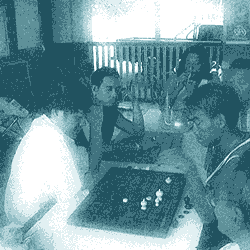Keeping History Alive
by Dolores
(Chicago Illinois US)
Chess began some two thousand years ago and was well established in India by the sixth century. The game was distinguished by its differently shaped pieces that have different powers. These characters initially represented military divisions and evolved into the contemporary pieces as the game entered Persia, Russia and Europe.
The Thai version of chess is called Makruk. It is unique in several ways. First, its evolution puts it close to the original Chinese and Indian versions of the game. Secondly, more Thai people play chess in their small country (some 2,000,000) than would be found proportionally elsewhere. Other countries have many fewer chess players today. The Makruk style game is more strategic than the Western Chess according to Kramnik a former World Chess Champ.
Because so many people in Thailand engage in this activity they serve historians by maintaining a living record of a century’s old establishment. Given the strategic training citizens receive from Makruk, it is no wonder that Thailand was never colonized since it was founded in 1238. The feel of pomp and circumstance with the game pieces makes them comfortable with kingly behaviors. Thailand has a constitutional monarchy form of government where King Phumiphon Adunyadet was crowned in June 1946. The 2007 constitution provides for the election of a prime minister who is limited to two four year terms.
Familiar with military order, all young people do serve in the military for two years at 21 years, they may volunteer earlier if they wish. Only a third of the population live in Bangock the main city so the country remains primarily rural where board games can bind families and communities in ways technology has yet to do. Economically Thailand has a steady growth rate and their literacy rate is over 90%.
While the Thai have served historians by maintaining this living history of Makruk, their government, military and economic structures benefit from this early and sustained exposure to strategic thinking.









